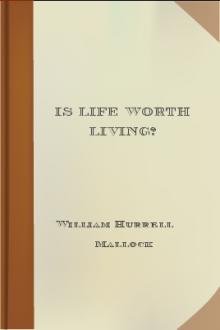Analyzing Character, Arthur Newcomb [popular romance novels .txt] 📗

- Author: Arthur Newcomb
- Performer: -
Book online «Analyzing Character, Arthur Newcomb [popular romance novels .txt] 📗». Author Arthur Newcomb
AN ATTEMPT IN ORANGE CULTURE
Going back to a brother in New York, I tried to land a job, but, of course, in such a state of mind, I could not. Then I went to my older brother in Cincinnati, where he was, and is, the pastor of a large church. Unfortunately, he did not take me by the back of the neck and kick me into some kind of work, any kind. At last, in March, 1908, he helped me to come out West. I landed in Los Angeles, and indirectly through a friend of his I secured a job on an orange ranch in the San Gabriel Valley, which I held until the end of the season. Once more I was happy and contented. It was certainly a pleasure to work.
That fall, or rather winter (1908), I secured a place near San Diego, where I had shelter and food during the winters and small wages during the active seasons in return for doing the chores and other work.
I had become possessed with a desire for an orange grove, and refused to consider how much it would take to develop one. I was finally able to secure a small tract of unimproved land. But I found that the task of clearing it would be too great for me because of the great trees, so for this and other reasons I snatched at a chance to file on a homestead in the Imperial Valley. This was in May, 1910. Later that summer I was able to sell my piece of land near San Diego at a profit, so that in September I went over to get settled on my homestead. I employed a fellow to help me make a wagon trail for a mile or more and to build my cabin for me. I moved in the first of November. Early in 1912 I decided it would be impossible to irrigate enough land there to make a living at that time. Also the difficulties of living alone so far out in the desert were greater than I had anticipated. With the help of a friend, I was able to make final proof in July and pay the government for the 160 acres, instead of having to continue to live on it. I did stay, however, until the general election in 1912.
AT WORK IN A SURVEYING CREW
Then I went to Los Angeles to get something to do. The town was full of people seeking work, as usual, most of whom could present better records than I could. To be sure, my friends and even my old correspondence school boss gave me splendid recommendations, but I felt my lack of business training and feared that 999 out of any 1,000 employers would not take a chance with me on such a record as I had. Consequently I did not try very hard. For a while I was with a real estate firm trying to secure applications for a mortgage. The commission was $25, but, naturally, that did not go far toward expenses. It was not long before I was in a bad mental condition again through worrying, self-condemnation, and uncertainty. It would not have been difficult to prove that I was 'insane.'
Finally an acquaintance of mine, a prominent lawyer, took up my case. He has a good personal and business friend who is the general manager of a large oil company with headquarters here in Bakersfield. When first appealed to, this gentleman refused point blank, because he had a bad opinion of college graduates in general (I really don't blame him or other business men); but the lawyer used his influence to the utmost with the result that I came up here in March, 1913, and was sent up into the oil fields. I was put under the civil engineer, and for two months I was sort of 'inspector' and 'force account' man in connection with the building of a supply railroad, but I gradually worked into the regular surveying crew, first as substitute rear chainman, and then as the regular one. Before long I was head chainman. I could have remained a chainman with the same crew to this time, but I left a little over a year ago, as there once more seemed a chance to earn a place in the country.
ANOTHER ATTEMPT AT ORANGE CULTURE
A young fellow, now located near Bakersfield, whom I had known in San Diego, told me great tales that I was too anxious to believe, and finally made some fine promises to help me get a piece of what he said was his land and to bring it to a productive state. But when I reached his place, in February, he was not ready, willing or able to carry out his promises. He kept me hanging on, however, and as I had used up my savings in a month's attendance at the short course of the State agricultural college and in bringing my goods from Bakersfield, I was compelled to get work from him as one of his orchard gang. I helped to set out several hundred trees and berry plants, and later knew what it meant to hoe for ten hours a day. I left him the latter part of July in order to work out a scheme I had thought of.
Sydney Williams Fig. 25. "Sydney Williams." For analysis see pages 206 to 210. Here is a fine, capable intellect, good sense of humor, optimism, cheerfulness, great refinement, and excellent critical powers in art and literature. But there is a deficiency of practicability. Note smallness and flatness of brows, narrowness of head just above the ears, fineness of features and height of head in center, above temples. Sydney Williams Fig. 26. "Sydney Williams." Note flatness of brows; smallness and fineness of features; fineness of texture; height of forehead and crown. Prof. Adolf von Menzel Fig. 27. Prof. Adolf von Menzel, Sociologist. A man of great intellect, especially interested in theoretical and statistical studies of people, in the mass, but not greatly interested in practical, material affairs. Note immense dome of forehead and head, with flatness at brows. Edgar Allan Poe Fig. 28. Edgar Allan Poe, Poet. Impractical, deficient in financial sense, but keenly alive to a world of fancy, ideals, dreams, imagery, beauty, mysticism and tragedy. Note high forehead, wide above, flat at brows and concave at sides; small nose and mouth, deep-set, gloomy eyes; dark complexion; and lack of symmetry and balance in head and features. Samuel Taylor Coleridge Fig. 29. Samuel Taylor Coleridge, Author. Highly intellectual, sentimental, impractical, sensitive, emotional. A man of high ideals and beautiful thoughts, and creative power. Note high, dome-shaped head; flat, high brows, fine, delicate features; weak mouth, and general softness of contour and expression. Thomas De Quincy Copyright by Harper & Brothers, N. Y. Fig. 30. Thomas De Quincy, Author. A man of fine, discriminating, logical intellect along purely mental lines, but impractical in material affairs. Note high, prominent forehead, with flat, poorly-developed brows, weak nose and mouth and narrow head. O. Henry Fig. 31. O. Henry, at the age of thirty. Impractical, lacking in desire for money and financial judgment. Creative, humorous, a lover of human nature, mild, rather easy-going, idealistic, constant. Note high forehead, flat at brows, full at sides along top, concave nose, full lips, prominent chin. Edwin Reynolds Fig. 32. Edwin Reynolds, of Wisconsin. Of the practical, matter-of-fact, literal type of intellect. Interested in facts, keenly observant, quick in thought, alert and positive in his mental activities. Note high, sloping forehead, very prominent at the brows, large nose, high in the bridge and well-developed."The first part of September I moved back to Bakersfield. I tried out my scheme by mail on two of the most prominent men in the country (one of the times when I had plenty of nerve). It did not work and the time did not seem auspicious for trying it on a greater number, especially as I did not have money enough to do it properly.
"While still working for the orchard man, I began to do some work in getting subscriptions for the Curtis publications. I did get a few. Later, about the middle of October, I went to Los Angeles, where I had a booth at an exhibition for three weeks in the interest of a publishing house. But it did not pay expenses, and I was deeper in debt than ever. I landed in Bakersfield nearly 'broke.' Thanks to the kindness of the people where I roomed and boarded, I was able to pull through until I obtained a loan last week, secured by a mortgage on my homestead.
"I was entirely unable to force myself to do any real canvassing while I was absolutely in need of each commission, but, now that I once more have a bank account, I hope to make myself keep at it until I can feel moderately successful. That is the one job I have fallen down on over and over (I have not even mentioned many of the attempts), and I believe I could be a real salesman if I could only get over my fear of approaching people on any proposition of immediate profit to me."
Here we have in detail the old, old story. How often have you heard of the man who graduated with high honors at the head of his class and was unable to make a living afterward? How many men of highest scholarship have you met who could not make a living for themselves and their families? Not long ago we were offered the services of a man who had degrees from several universities in America and Europe, who was master of several languages, and who was glad to offer to do a little translating at twenty-five cents an hour.
AN ANALYSIS OF SYDNEY WILLIAMS
What handicaps these men? They have good intellects, or they would be unable to win high honors in colleges and universities. It is fitting that they should educate themselves highly, since they are so capable of attainment in scholarship. Surely, they ought to do some intellectual work of some kind, because they are not fitted for manual labor. Where do they belong? What is their particular type? What opportunities are there for their unquestioned talents?
Here is what we wrote to Sydney Williams:
"From photographs and data submitted, I should judge your type of organization, character and aptitudes to be as follows:
"You have inherited only a fairly good physical constitution. You will always need to take care of yourself, but there is absolutely no reason why you should worry in regard to your health.
"Under stress and strain your nervous system may give you trouble, and there may be some tendency to digestive disturbances, but if you will practice moderation, live on a well-balanced and sensibly selected diet, and keep yourself from extremes of every kind you will probably maintain very fair health and strength for many years.
"Intellectually you have a good, active mind of the theoretical type. Your mind is quick to grasp theories, ideals, abstractions, and such intangible and purely mental concepts. Your imagination is active, and is inclined to run away with plans, schemes, and inventions, with speculations and with visions of future prospects. However, your plans and inventions are liable to be purely along mental and intellectual lines, rather than practical.
"You do not observe well. You are a little too careless in regard to your facts. You therefore have a tendency to go ahead with your theories and your plans upon insufficient data or





Comments (0)